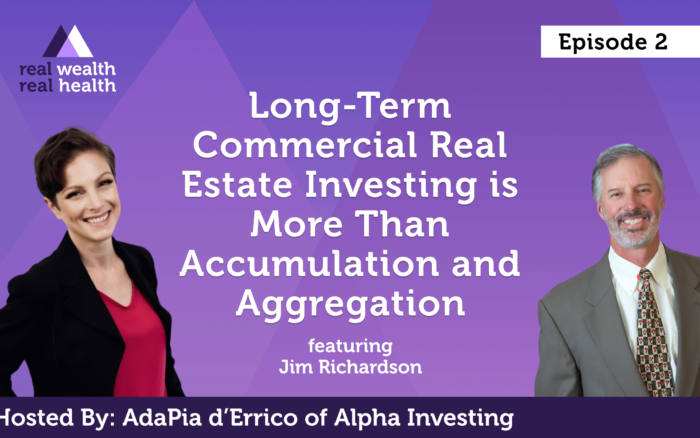
The Four Non-Obvious Truths For Evaluating Investment Opportunities
Using intellect, intuition, rational analysis and the “gut-check” to holistically approach a deal.

Using intellect, intuition, rational analysis and the “gut-check” to holistically approach a deal.

Technology, data and human discernment form the foundation for effective and efficient investment evaluation in the modern economy.

Seasoned investor Jim Richardson paints a picture of the lifecycle and evolution of a successful commercial real estate entrepreneur.

AdaPia d’Errico and Daniel Cocca of Alpha Investing chat with seasoned real estate pro, Dr. Adam Gower, to discuss some of the core principles he’s applied to real estate investing over the last 35 years and the perspective he’s gained experiencing real estate from the ground up

In both commercial and residential real estate investing, understanding the roles and responsibilities of each player is critical for achieving success. Among these, the role of the sponsor stands out as one of the most pivotal. For those new to CRE or seasoned investors looking to optimize their portfolio, understanding the function and importance of the sponsor is essential.

In the world of real estate private equity, the term "risk-adjusted returns" is frequently touted as a measure of investment success. But what exactly does this mean, and how can investors use it to make more informed decisions?
Understanding risk-adjusted returns is essential for evaluating investment opportunities, especially in commercial real estate, where the balance between risk and return can significantly impact portfolio performance. In theory, the higher the risk, the higher the projected return. However, in practice, there are opportunities where an investor is being overpaid for the risk they are taking – this is what we mean when we say a deal presents favorably on a risk-adjusted basis.

Trying to evaluate a multifamily apartment building for its potential as a commercial real estate investment? Here are our most important considerations when evaluating a new deal.

Americans are starting to live longer, more active lives than the seniors of generations past. In turn, the range of senior housing and service offerings has evolved to better match their lifestyle preferences. This growth represents a great opportunity for investment in senior housing opportunities

In 2024, savvy investors are redefining what constitutes an “institutional quality” asset, uncovering tremendous opportunities in sectors and markets that have historically been overlooked. This shift is driven by a deeper understanding of market dynamics and the recognition that traditional definitions of institutional quality real estate might be too narrow for today's diversified investment strategies.

Prudent investors understand that diversification is a cornerstone of financial stability in any portfolio. Among the various options for diversification, one of the most prominent alternatives to conventional investments - such as stocks, bonds, and cash - is real estate. This asset class offers both current income and long-term wealth generation, and has proven to be an effective hedge against inflation, especially in today's economic climate.
In 2024, with inflation still a concern and interest rates remaining elevated, the inclusion of real estate in a diversified portfolio is more crucial than ever. Here’s why real estate private equity should be a key component of your investment strategy.
Join the Alpha Investing Newsletter for updates on our company.